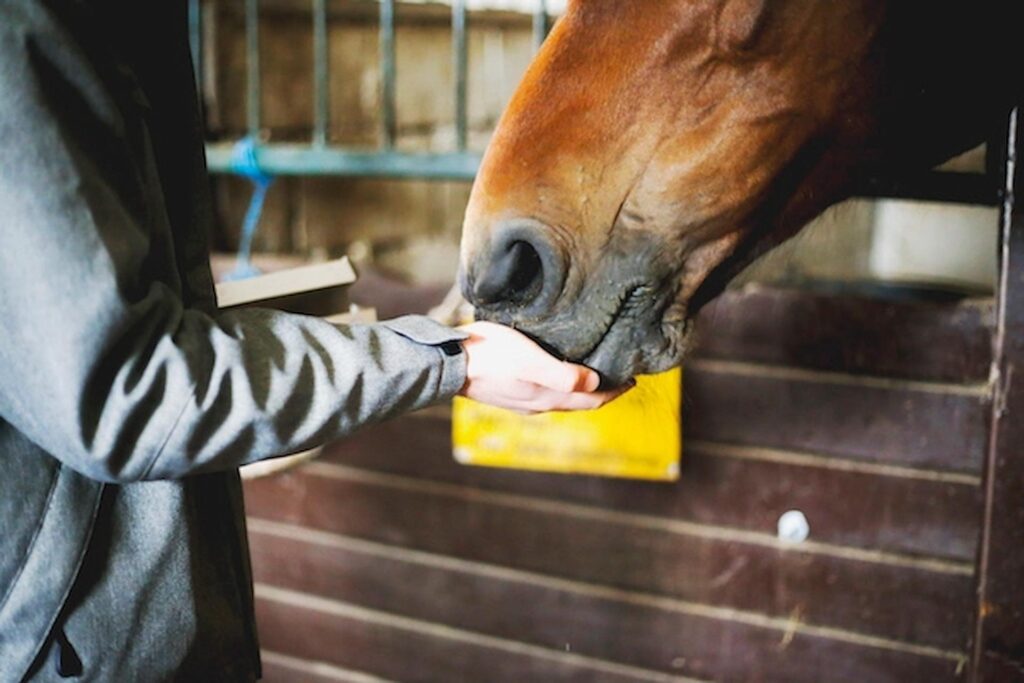It’s essential that your horse’s diet reflects the work they do. This means they’ll be able to maintain their condition and perform at their best, reducing the chance of fatigue, injury, and behavioural changes. Knowing how to prevent overworking and underfeeding in horses is crucial to promote good health and sufficient nutrient intake. Below, we’ll take a look at how your horse’s diet should be adapted to their work to avoid these issues, including high-fibre horse feed for horses in harder work, and how to spot the signs and symptoms.
Overworking A Horse: Signs And Symptoms
Whilst it may not be one of the first issues you think about when managing your horse, overworking can be a problem for those that are not equipped for the workload they take on. There are a few factors that can cause your horse to become overworked, such as a lack of conditioning. If your horse is not prepared for hard work, it’s more likely to become injured and fatigued more easily than a horse that’s been conditioned with this in mind. This can also relate to the issue of horses being pushed past their physical limits. Horses also need a diet that can support their workload, so if this is not adequate and does not meet their needs, a horse is likely to become lethargic. Horses – just like humans – need rest to recuperate, without this, injuries, illness, and fatigue are likely to set in.
So, what are some of the tell-tale signs? If you fear your horse is overworked, look out for:
- Fatigue: This is one of the most obvious. If your horse seems lethargic or more tired than usual even after minimal exercise or exertion, this could mean they’re overworked.
- Lack Of Appetite: If your horse is overworked, it may suffer a lack of appetite. Be sure to keep an eye on how much your horse is eating if you suspect overworking, as this can be an indicator of stress. As a result of this, you may also notice weight loss.
- Behavioural Changes: If you fear your horse is overworked, you may notice they seem irritable or anxious.
- Injuries: Overworking can cause injuries like tears and strains due to lack of recovery time and rest. An overworked horse is more likely to have injury issues.
How Can You Rectify This?
If you suspect your horse is overworked, there are a few steps you can take to ensure that they recover back to full health, and reduce the risk of this happening in the future. The first and most important is that you consult a vet if you think it is necessary. From there, if you’re not sure on how to best prepare your horse for the work you want to do, consult a trainer. They will help you prepare a training plan building in the periods of rest your horse needs. Correct nutrition to suit their workload and individual dietary requirements is also important so consult a nutritionist for guidance.
Underfeeding A Horse: Signs And Symptoms
Each horse has individual needs depending on the work they carry out, as well as their age and weight. Because of this, your horse’s diet needs to be specially adjusted for them so they can benefit from the nutrients they need. It can be surprising just how much feed a horse needs and simply not feeding enough is one of the most common reasons horse’s lose weight. You may also notice that your horse’s coat is dull or rough, which can be a sign they are lacing vitamins and minerals in the diet. Lethargy and decreased performance are also other issues that can become noticeable in an underfed horse – if your horse is not getting the correct feed, it won’t be able to perform as it usually would.
How Can You Rectify This?
You should start by assessing your horse’s diet – does it meet their needs in terms of energy and nutrients required? Finding deficiencies in your diet will not only explain a lot about your horse’s health but will allow you to rectify these issues as best possible. Firstly, make sure your horse has access to forage like hay or pasture, as this is packed with fibre and additional nutrients. If you’re using supplements, it may be necessary to increase them to see if this has a positive impact on your horse. If you increase the feed and nothing changes you must contact your vet as it may indicate an underlying serious issue.


More Stories
Why Hire a Workers Compensation Attorney in Lowell, MA? Tips, Benefits, and More!
Incidentalseventy: Serendipity in Everyday Life
Reignite Your Romance: Unveiling the Magic of Marriage Retreats